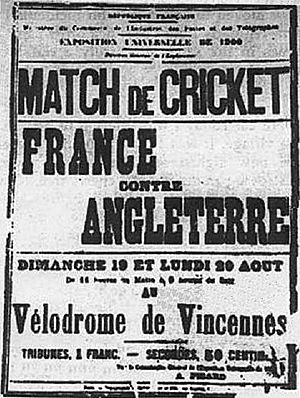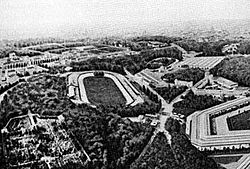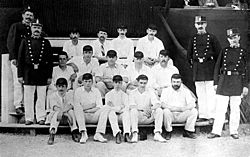Cricket at the 1900 Summer Olympics facts for kids
Quick facts for kids Men's cricketat the Games of the II Olympiad
|
|||||||
|---|---|---|---|---|---|---|---|
 |
|||||||
| Venue | Vélodrome de Vincennes | ||||||
| Date | 19–20 August | ||||||
| Competitors | 24 from 2 nations | ||||||
| Medalists | |||||||
|
|||||||
The cricket tournament at the 1900 Summer Olympics was a special event. It happened on August 19-20 at the Vélodrome de Vincennes in Paris. Only one match was played. It was between teams from Great Britain and France. Great Britain won the match by 158 runs.
At first, more countries like Belgium and the Netherlands were supposed to play. But they decided not to, leaving just Great Britain and France. The teams weren't chosen as official national teams. The British team was a club called the Devon and Somerset Wanderers. The French team, the Union des Sociétés Françaises de Sports Athlétiques, was mostly made up of British people living in Paris.
The game lasted two days. Great Britain scored 117 runs first, and then bowled France out for 78 runs. Great Britain then scored 145 runs in their second turn. This meant France needed 185 runs to win. But France was bowled out for only 26 runs, giving Great Britain a big win. This happened with only five minutes left in the match! The British team first received silver medals, and the French team got bronze. They also got small Eiffel Tower statues. Later, in 1912, the match was officially called an Olympic event. The medals were then changed to gold for Great Britain and silver for France.
Contents
History of Olympic Cricket
Cricket was planned for the very first modern Olympics in 1896 in Athens. But not enough teams signed up, so it was cancelled. Four years later, for the Paris Games in 1900, there were similar problems. Belgium and the Netherlands were going to play, but they pulled out. This left only Great Britain and France to compete.
The 1900 Olympics were a bit messy in general. Events took place over six months, from May to October. Many events, including cricket, were also part of a big event called the World's Fair in Paris.
Who Played?
The teams weren't official national teams. Great Britain was represented by a touring club from England called the Devon and Somerset Wanderers. This club was started by William Donne in 1894. Many players were from the Castle Cary Cricket Club. Some were also former students from Blundell's School. The rest were players from nearby areas who could take time off. An expert named Ian Buchanan said both teams were made up of "distinctly average club cricketers." Only two players from the British team and none from the French team had played first-class cricket before.
The French team was supposed to be from all the clubs in the Union des Sociétés Françaises de Sports Athlétiques. But most of these clubs didn't even have cricket teams. So, the French team was chosen from just two clubs: the Union Club and the Standard Athletic Club. Both clubs had strong English connections. Most of the players on the French Olympic team were British people who had moved to France. The Standard Athletic Club was even started by English workers who helped build the Eiffel Tower.
The Match
The match was meant to have eleven players per side. But the captains agreed to have twelve players instead. This surprised the people printing the scorecards, so they had to add the extra name by hand!
The game started at 11:00 AM on Sunday, August 19. The British team batted first. They scored 117 runs. Only four players scored more than ten runs. Frederick Cuming scored the most with 38 runs. Their captain, C. B. K. Beachcroft, scored 23. Then, the French team batted and was bowled out for 78 runs. Frederick Christian took seven wickets for Great Britain. Play ended at 5:00 PM on the first day. Great Britain had a lead of 39 runs.
On the second morning, the British team batted much better. They scored 145 runs and stopped their innings with five wickets down. Beachcroft scored 54 runs, and Alfred Bowerman scored the most with 59 runs. France needed 185 runs to win. But they lost their first ten wickets for only eleven runs! They tried to play slowly to make the game end in a draw. They almost did it! The match was just five minutes from ending when their last wicket fell. This gave Great Britain a 158-run victory. Montagu Toller was the best bowler for Great Britain in the second innings, taking seven wickets for only nine runs.
After the match, the English team got silver medals, and the French team got bronze. Both teams also received small statues of the Eiffel Tower. The match wasn't reported in big newspapers in England or France. Only some local newspapers in Devon, England, wrote about it.
What Happened Next?
The Devon and Somerset Wanderers played two more matches in France after the Olympics. They won both of those games too. A journalist at the time said the French players were "too excitable to enjoy the game."
Neither team knew they were playing in the Olympic Games at the time! The match was advertised as part of the World's Fair. Even though the Olympic committee never officially decided which events were "Olympic," the medals were later changed. Great Britain's silver became gold, and France's bronze became silver.
Cricket was supposed to be in the 1904 Summer Olympics in St. Louis. But it was cancelled again because there weren't enough teams or good places to play. Cricket has not been part of the Olympic Games since then.
Because the match had 12 players per side and lasted only two days, it isn't considered a "first-class" cricket match. Still, it was the only international cricket match played that year.
Medal Winners
| Event | Gold | Silver |
|---|---|---|
| Cricket | Devon and Somerset Wanderers C. B. K. Beachcroft (captain) |
French Athletic Club Union William Anderson |
| Reference: Australian Broadcasting Corporation | ||
See also
 In Spanish: Anexo:Críquet en los Juegos Olímpicos de París 1900 para niños
In Spanish: Anexo:Críquet en los Juegos Olímpicos de París 1900 para niños
 | James Van Der Zee |
 | Alma Thomas |
 | Ellis Wilson |
 | Margaret Taylor-Burroughs |




